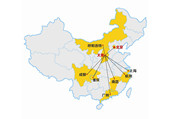China revitalizes township governments
( Xinhua )
Updated: 2011-11-26
ANZE COUNTY, Shanxi Province - Zhang Ruihai faced a potentially life-threatening situation late one night when heavy rains triggered a mudslide near his home in a village in north China.
However, instead of calling the local fire department, he pulled out a small card with a telephone number on it and dialed up a local government official.
"The phone was answered right after I called. The township sent over more than 10 people," Zhang said. The workers sent by the township cleared away the earth surrounding Zhang's home on the very same day.
Zhang's village is part of Fucheng township, which is administered by Anze county in north China's Shanxi province. The county government has distributed cards with contact numbers for township-level service centers to residents in all seven of the county's towns, providing them with around-the-clock service.
"In the past, we had to go directly to the township to contact officials. We had to wait if they were having a meeting," Zhang recalled. "Now we, the common people, can be helped 24/7."
The service center in Fucheng is fully equipped with touchscreens, computers and telephones. Local residents can seek advice and help from the center via mail, telephone, Internet or by visiting in person.
The Fucheng town spent over 240,000 yuan (37,800 U.S. dollars) to buy equipment and set up the center, according to Niu Fusheng, the head of Fucheng township government.
"All of the people from the township government have to work their shifts at the center. Our work load has increased, but we work more efficiently," said Niu.
For each 24-hour shift, four staff members team up with two township officials. If a township resident makes any kind of request other than a consultation, they are required to arrive on the spot within half an hour and solve the problem within three days, according to Niu.
"No resident has evaded the village or township government to appeal directly to the county government ever since," said Niu.
In China, complaining directly to higher authorities is a common yet problematic practice. Anze county's system seeks to combat this problem by requiring officials at the village and township levels to accompany local residents to appeal to higher authorities if the officials can't handle the problem themselves. Higher authorities are also required to set aside time for visiting residents.
"This has effectively prevented community-level officials from shirking their responsibilities. It is also a way to assess their work attitude and ability," said Ren Xiuhong, the Communist Party of China (CPC) chief of Anze county.
Liu Desheng, an elderly resident of the township, has been quite grateful for the new system. In July, Liu complained to his village that a shared doorway built by his neighbor was too high. Unable to settle the issue on their own, Liu and a village official went together to the township government and the land bureau of the county government. The township eventually paid to rebuild the doorway.
"The officials really made an effort. I am very satisfied," said Liu.
Since June 2011, village-level service stations have received 325 on-site complaints and mediated 564 civil disputes. The numbers are less than 100 for township-level requests. The county-level department received only nine complaints, according to Hou Yongjun, who works at the Anze county service center.
Most of the requests are inquiries about subsidies, disputes over housing issues and emergencies, said Hou.
Functions marginalized
The township is the most basic unit of government in rural China. But its functions have been weakened and marginalized over the past decades, Ren said.
Before China's exemption of agricultural taxes in 2006, most farmers would complain to township officials when they came to collect taxes, according to Ren.
Now community-level officials are mainly in charge of distributing money -- including agricultural subsidies and funds -- rather than collecting money. Farmers are reluctant to turn to them for help, as they worry that they may be disqualified for funding if they raise too many complaints.
Therefore, the county-level government becomes the frontline for dealing with rural complaints, Ren said.
Ren also pointed out that officials from the township government are often too specialized to answer questions concerning areas of rural life that they are not familiar with.
To revitalize township governments, Anze county set up a unified administrative service center in each town to address people's problems and maintain social stability. Each service center also functions as a platform that combines government web portals with websites for the local discipline inspection department and police department.
Reorganizing local government functions is also helping to boost community-level officials' sense of responsibility, Niu said.
"The people are satisfied with us, and we have rediscovered the feeling of being needed by the people," Niu said.




